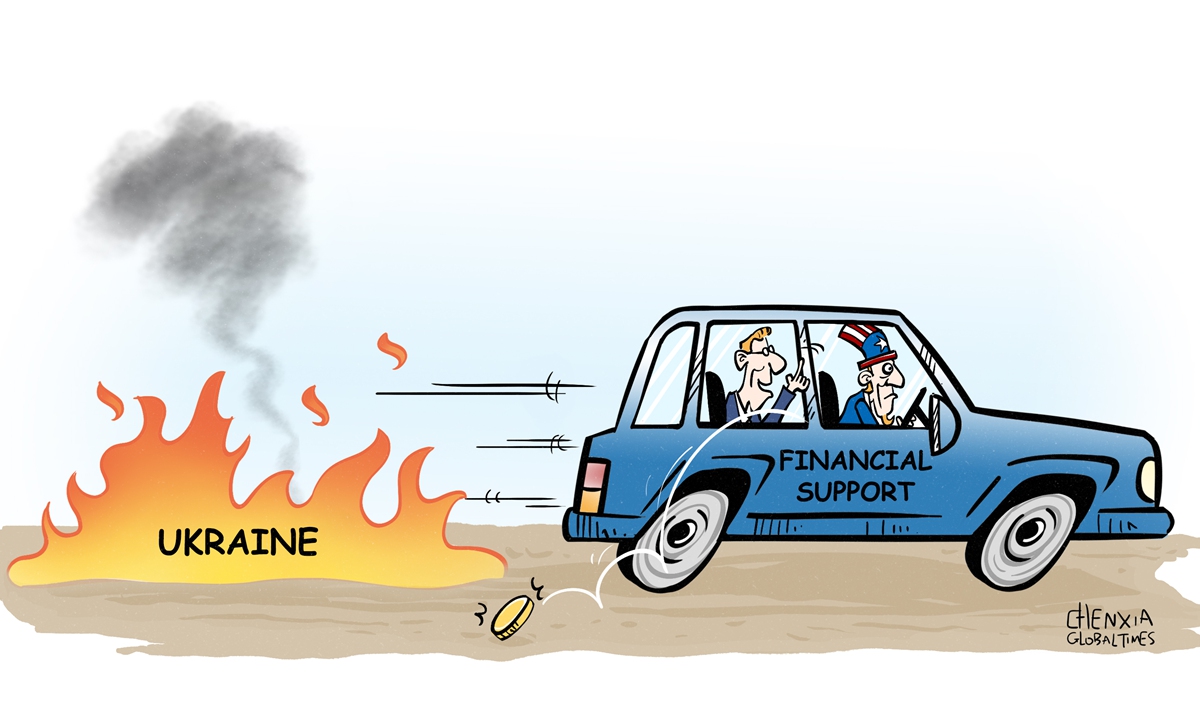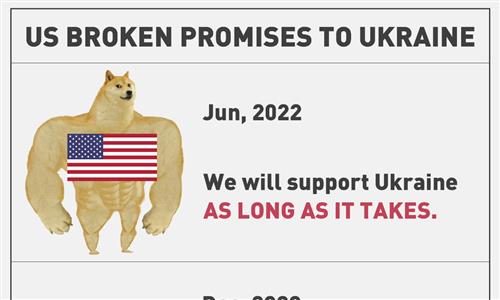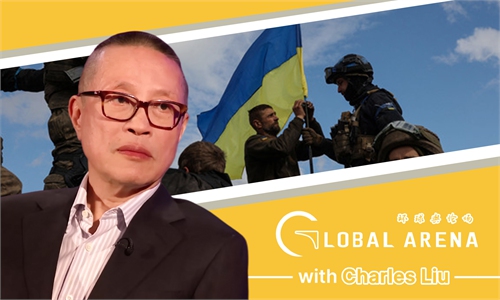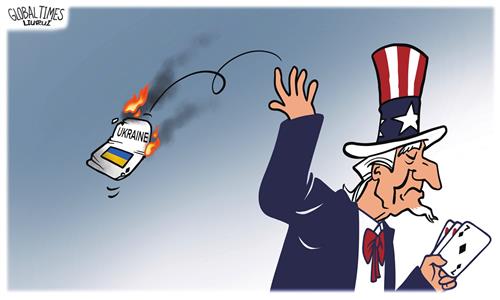Can budget deficit and coming elections in US contribute to mitigation in Ukraine?

Illustration: Chen Xia/GT
As a result of their economic shocks and social and political unrest, the US and the EU have drastically reduced financial support for Ukraine. Washington and Brussels fearlessly restate their commitments to Kiev and declare belief in the earliest possible victory over Russia, despite the obvious circumstances. Moscow calls for negotiations, but the fundamental objectives of its special military operation are unwavering. Can budget deficit and coming elections in the US contribute to mitigation in Ukraine?
The majority of NATO nations and their allies in the Pacific, who make up the global West, believe that Russia's actions toward Ukraine in February 2022 are what started the current global crisis. However, far more crucial points are humbly retouched, like several waves of NATO's expansion and its unilateral assault against Serbia in 1999. Those events triggered a significant upheaval in security domain.
In late January or early February, the EU will try again to reach an agreement on financial support for Ukraine, since they were unable to approve a four-year financial agreement worth 50 billion euros in December 2023. It will be difficult to get the approval of all members. Surprisingly, the European Commission tied Kiev's financial help to EU fiscal obligations, sparking heated discussions. In particular, Germany and the Netherlands were unwilling to use their government money to support the EU. Slovakia, like Hungary before it, stopped sending military supplies to Ukraine in October 2023. Finally, Hungarian Prime Minister Viktor Orban delayed the next European aid package, which undermined the unity position and stoked discontent.
Since February 2022, more than $38 billion in direct military support to Ukraine was pledged by all member states of the EU, according to CNN. However, only 843 million euros had been allocated for humanitarian purposes. Literally, nearly all of the money goes into the coffers of European arms producers and mediators, with a small portion going to NGOs and local authorities. A sizable number of weapons supplied by EU nations have reportedly turned up in conflict areas in the Middle East, Central Africa and other regions of the world.
There are still crazies in Europe who demand that the Ukrainian military use more deadly weapons. For example, some German lawmakers are adamant about giving Kiev 500-kilometer-range Taurus cruise missiles. Such a claim is more of a cynical attempt to push Taurus on the international arms market than it is a simple bloodlust, given that its nearest rival, Storm Shadow/SCALP, is being actively employed in combat.
The US Congress has not been able to come to a consensus on additional funding for Ukraine since September 2023. The all-inclusive proposal includes $106 billion to defend US interests in the Indo-Pacific, strengthen the border with Mexico, and assist Israel and Ukraine. This appears overly broad and blatantly abundant for the majority of Republicans. Furthermore, Republicans ultimately abandoned a plea for $61 billion after mostly rejecting Zelensky's request to meet in December. President Biden consequently asserted that the US' ability to assist Ukraine was almost at an end and provided a mere $200 million from his sources. Congress shows more concern about drug trafficking, illegal immigration and violent crime as elections draw nearer since these issues require significant attention and resources than either Israel or Ukraine.
Former US president Donald Trump has declined to commit to continuing military assistance for Ukraine following his victory in the 2024 campaign, and has said he will simply solve the conflict "in 24 hours."
All opinions that Washington's policy toward Russia will improve following the US' 2024 presidential election are real but a little narrow-minded. The US is not governed by a single president, but rather by a deep state made up of rival groups of capitalist raptors. For them, profit rationale dominates. Democrats anticipate engagement with Russia in negative negotiations until the end of 2024. Nevertheless, America is likely to be distant from the war for this year until domestic issues are mitigated. This is clear by the diminished number of capable arms in recent support packages. In addition, resistance is currently there in Europe; it began with the budget deficit and appears to have culminated in an awareness of the ridiculousness of continuing the struggle.
So, both the US and the EU are leaning toward freezing the conflict, and the spirit of the 1953 Korean armistice scenario is repeatedly summoned by foreign experts. But Moscow's position is firm. The goal is achieved when the West agrees on Ukraine's neutrality. Without legal framework and guarantees of non-remilitarization, even more severe conflict would be ignited afterwards. The best option for the West is to allow Russia to carry on without global ambitions and significant power, but with abundant cheap energy and spacious market. It worked somehow after the collapse of the Soviet Union and unlikely to be resumed ever again. No concessions can still be expected from either the US or the EU in 2024, one possible outcome is their acquiescence of Russia's designed status quo.
The author is an associate professor at the International Relations Department, Far Eastern Federal University, and adjunct-professor at the North-East Asia Research Center, Jilin University. opinion@globaltimes.com.cn



